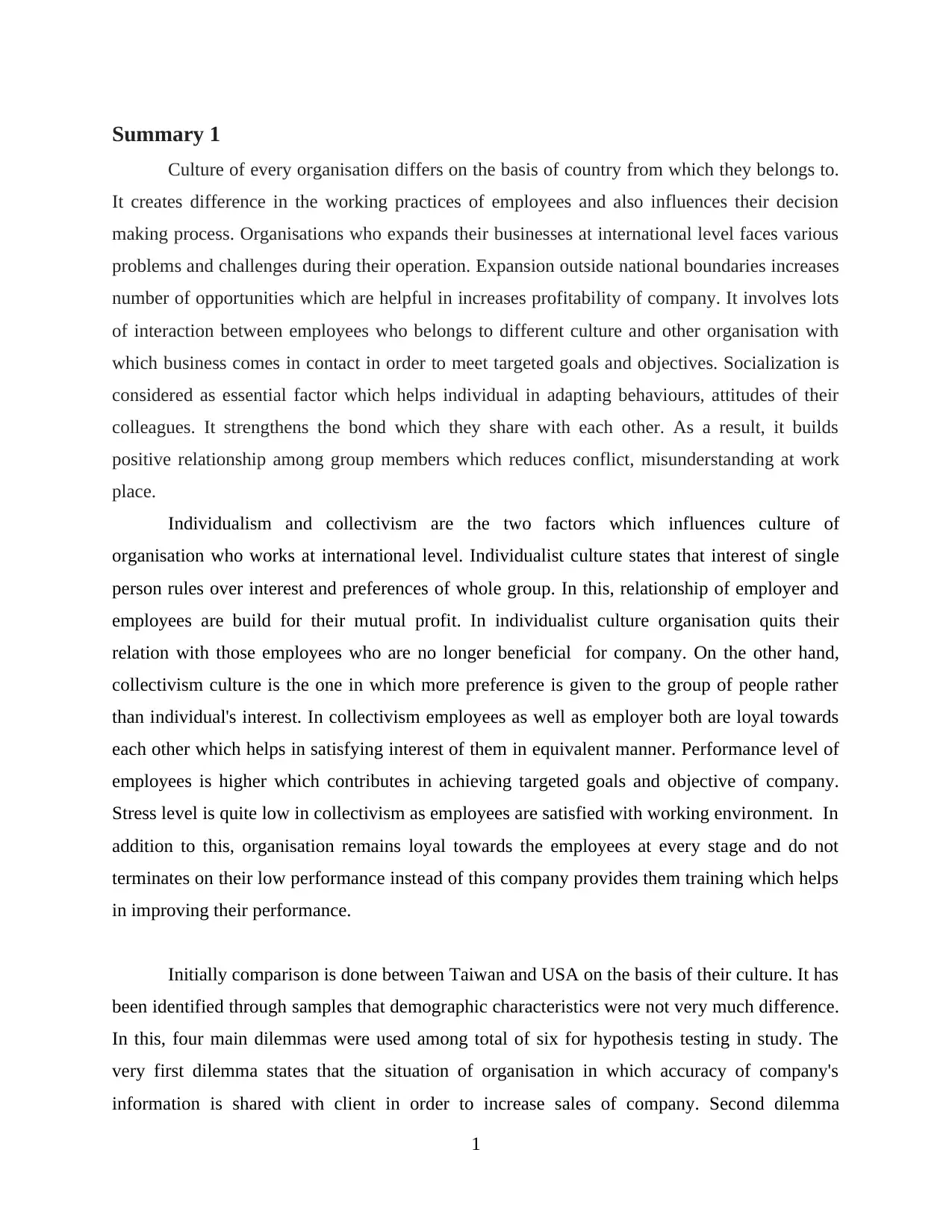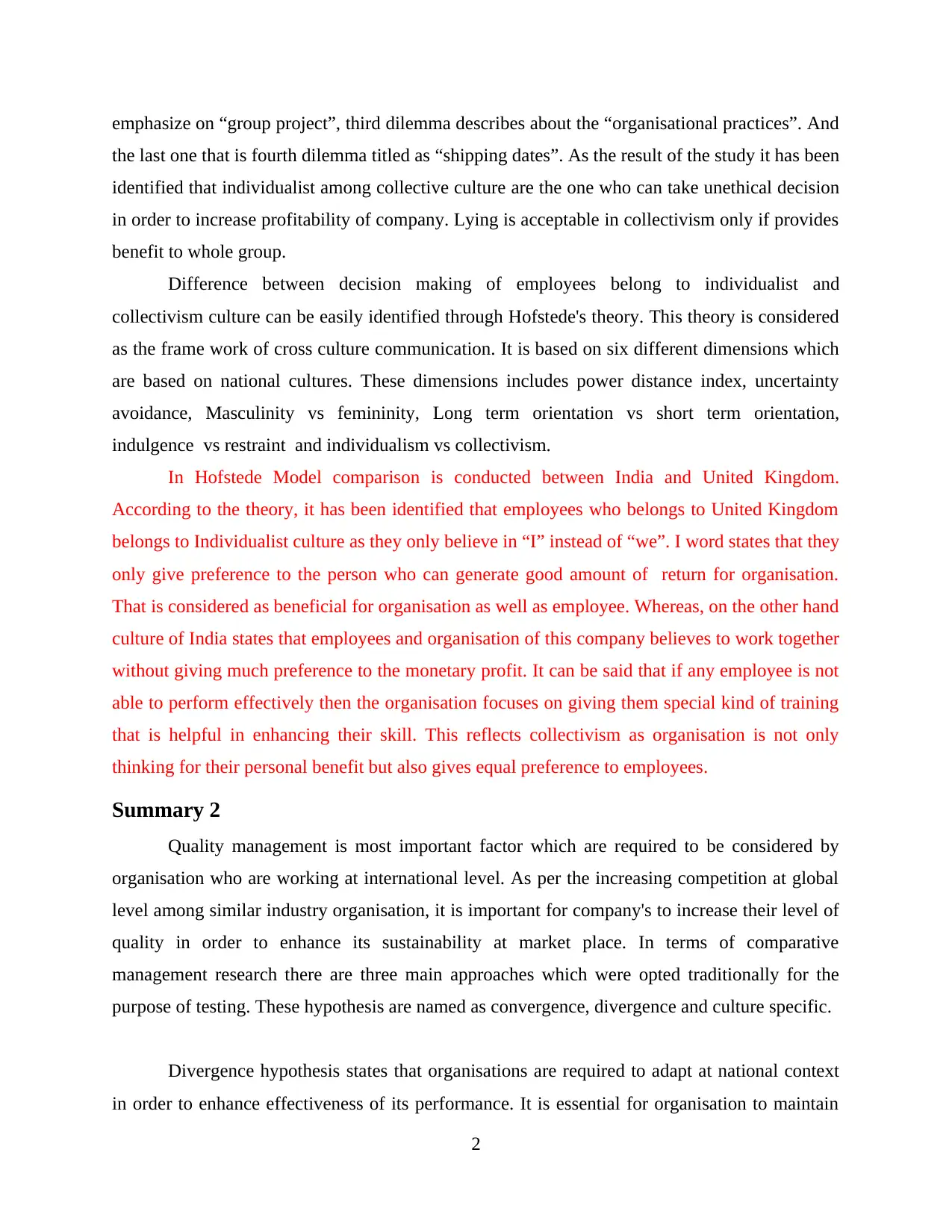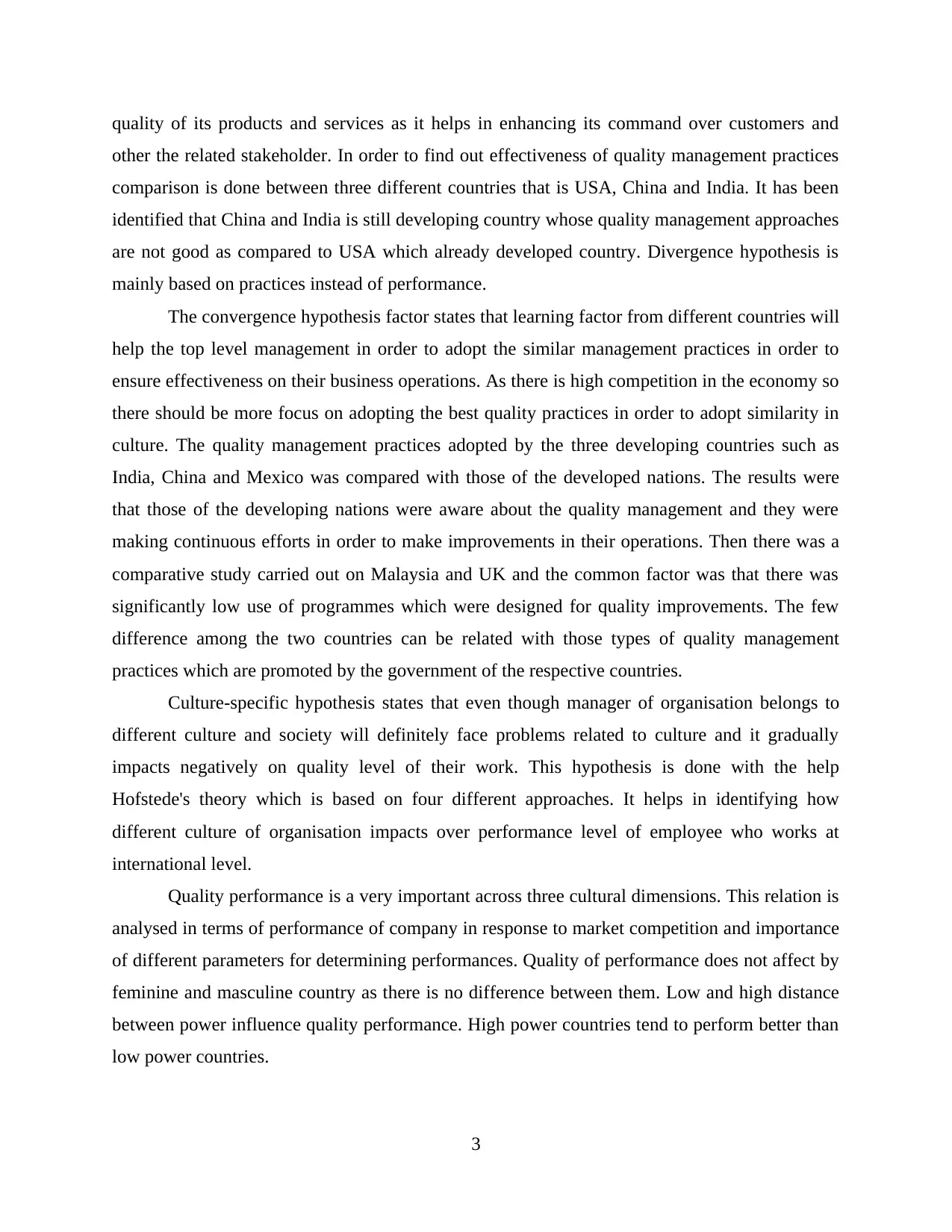Cross-Cultural Management: Hofstede's Theory and Quality Report
VerifiedAdded on 2020/10/22
|6
|1274
|182
Report
AI Summary
This report offers a comprehensive overview of cross-cultural management, delving into the impact of national culture on organizational practices and decision-making. It explores the concepts of individualism versus collectivism, highlighting their influence on employee behavior and organizational performance in an international context. The report analyzes Hofstede's cultural dimensions, using them to compare the cultural nuances between the United States, Taiwan, India, and the United Kingdom. Furthermore, it examines quality management practices across different countries, including the United States, China, and India, and discusses the convergence, divergence, and culture-specific hypotheses. The report concludes by assessing the impact of cultural dimensions on quality performance, emphasizing the importance of adapting management strategies to diverse cultural contexts for improved international business outcomes.

Cross Cultural Management
Paraphrase This Document
Need a fresh take? Get an instant paraphrase of this document with our AI Paraphraser

Table of Contents
Summary 1 ......................................................................................................................................1
Summary 2.......................................................................................................................................2
.........................................................................................................................................................3
Summary 1 ......................................................................................................................................1
Summary 2.......................................................................................................................................2
.........................................................................................................................................................3

Summary 1
Culture of every organisation differs on the basis of country from which they belongs to.
It creates difference in the working practices of employees and also influences their decision
making process. Organisations who expands their businesses at international level faces various
problems and challenges during their operation. Expansion outside national boundaries increases
number of opportunities which are helpful in increases profitability of company. It involves lots
of interaction between employees who belongs to different culture and other organisation with
which business comes in contact in order to meet targeted goals and objectives. Socialization is
considered as essential factor which helps individual in adapting behaviours, attitudes of their
colleagues. It strengthens the bond which they share with each other. As a result, it builds
positive relationship among group members which reduces conflict, misunderstanding at work
place.
Individualism and collectivism are the two factors which influences culture of
organisation who works at international level. Individualist culture states that interest of single
person rules over interest and preferences of whole group. In this, relationship of employer and
employees are build for their mutual profit. In individualist culture organisation quits their
relation with those employees who are no longer beneficial for company. On the other hand,
collectivism culture is the one in which more preference is given to the group of people rather
than individual's interest. In collectivism employees as well as employer both are loyal towards
each other which helps in satisfying interest of them in equivalent manner. Performance level of
employees is higher which contributes in achieving targeted goals and objective of company.
Stress level is quite low in collectivism as employees are satisfied with working environment. In
addition to this, organisation remains loyal towards the employees at every stage and do not
terminates on their low performance instead of this company provides them training which helps
in improving their performance.
Initially comparison is done between Taiwan and USA on the basis of their culture. It has
been identified through samples that demographic characteristics were not very much difference.
In this, four main dilemmas were used among total of six for hypothesis testing in study. The
very first dilemma states that the situation of organisation in which accuracy of company's
information is shared with client in order to increase sales of company. Second dilemma
1
Culture of every organisation differs on the basis of country from which they belongs to.
It creates difference in the working practices of employees and also influences their decision
making process. Organisations who expands their businesses at international level faces various
problems and challenges during their operation. Expansion outside national boundaries increases
number of opportunities which are helpful in increases profitability of company. It involves lots
of interaction between employees who belongs to different culture and other organisation with
which business comes in contact in order to meet targeted goals and objectives. Socialization is
considered as essential factor which helps individual in adapting behaviours, attitudes of their
colleagues. It strengthens the bond which they share with each other. As a result, it builds
positive relationship among group members which reduces conflict, misunderstanding at work
place.
Individualism and collectivism are the two factors which influences culture of
organisation who works at international level. Individualist culture states that interest of single
person rules over interest and preferences of whole group. In this, relationship of employer and
employees are build for their mutual profit. In individualist culture organisation quits their
relation with those employees who are no longer beneficial for company. On the other hand,
collectivism culture is the one in which more preference is given to the group of people rather
than individual's interest. In collectivism employees as well as employer both are loyal towards
each other which helps in satisfying interest of them in equivalent manner. Performance level of
employees is higher which contributes in achieving targeted goals and objective of company.
Stress level is quite low in collectivism as employees are satisfied with working environment. In
addition to this, organisation remains loyal towards the employees at every stage and do not
terminates on their low performance instead of this company provides them training which helps
in improving their performance.
Initially comparison is done between Taiwan and USA on the basis of their culture. It has
been identified through samples that demographic characteristics were not very much difference.
In this, four main dilemmas were used among total of six for hypothesis testing in study. The
very first dilemma states that the situation of organisation in which accuracy of company's
information is shared with client in order to increase sales of company. Second dilemma
1
⊘ This is a preview!⊘
Do you want full access?
Subscribe today to unlock all pages.

Trusted by 1+ million students worldwide

emphasize on “group project”, third dilemma describes about the “organisational practices”. And
the last one that is fourth dilemma titled as “shipping dates”. As the result of the study it has been
identified that individualist among collective culture are the one who can take unethical decision
in order to increase profitability of company. Lying is acceptable in collectivism only if provides
benefit to whole group.
Difference between decision making of employees belong to individualist and
collectivism culture can be easily identified through Hofstede's theory. This theory is considered
as the frame work of cross culture communication. It is based on six different dimensions which
are based on national cultures. These dimensions includes power distance index, uncertainty
avoidance, Masculinity vs femininity, Long term orientation vs short term orientation,
indulgence vs restraint and individualism vs collectivism.
In Hofstede Model comparison is conducted between India and United Kingdom.
According to the theory, it has been identified that employees who belongs to United Kingdom
belongs to Individualist culture as they only believe in “I” instead of “we”. I word states that they
only give preference to the person who can generate good amount of return for organisation.
That is considered as beneficial for organisation as well as employee. Whereas, on the other hand
culture of India states that employees and organisation of this company believes to work together
without giving much preference to the monetary profit. It can be said that if any employee is not
able to perform effectively then the organisation focuses on giving them special kind of training
that is helpful in enhancing their skill. This reflects collectivism as organisation is not only
thinking for their personal benefit but also gives equal preference to employees.
Summary 2
Quality management is most important factor which are required to be considered by
organisation who are working at international level. As per the increasing competition at global
level among similar industry organisation, it is important for company's to increase their level of
quality in order to enhance its sustainability at market place. In terms of comparative
management research there are three main approaches which were opted traditionally for the
purpose of testing. These hypothesis are named as convergence, divergence and culture specific.
Divergence hypothesis states that organisations are required to adapt at national context
in order to enhance effectiveness of its performance. It is essential for organisation to maintain
2
the last one that is fourth dilemma titled as “shipping dates”. As the result of the study it has been
identified that individualist among collective culture are the one who can take unethical decision
in order to increase profitability of company. Lying is acceptable in collectivism only if provides
benefit to whole group.
Difference between decision making of employees belong to individualist and
collectivism culture can be easily identified through Hofstede's theory. This theory is considered
as the frame work of cross culture communication. It is based on six different dimensions which
are based on national cultures. These dimensions includes power distance index, uncertainty
avoidance, Masculinity vs femininity, Long term orientation vs short term orientation,
indulgence vs restraint and individualism vs collectivism.
In Hofstede Model comparison is conducted between India and United Kingdom.
According to the theory, it has been identified that employees who belongs to United Kingdom
belongs to Individualist culture as they only believe in “I” instead of “we”. I word states that they
only give preference to the person who can generate good amount of return for organisation.
That is considered as beneficial for organisation as well as employee. Whereas, on the other hand
culture of India states that employees and organisation of this company believes to work together
without giving much preference to the monetary profit. It can be said that if any employee is not
able to perform effectively then the organisation focuses on giving them special kind of training
that is helpful in enhancing their skill. This reflects collectivism as organisation is not only
thinking for their personal benefit but also gives equal preference to employees.
Summary 2
Quality management is most important factor which are required to be considered by
organisation who are working at international level. As per the increasing competition at global
level among similar industry organisation, it is important for company's to increase their level of
quality in order to enhance its sustainability at market place. In terms of comparative
management research there are three main approaches which were opted traditionally for the
purpose of testing. These hypothesis are named as convergence, divergence and culture specific.
Divergence hypothesis states that organisations are required to adapt at national context
in order to enhance effectiveness of its performance. It is essential for organisation to maintain
2
Paraphrase This Document
Need a fresh take? Get an instant paraphrase of this document with our AI Paraphraser

quality of its products and services as it helps in enhancing its command over customers and
other the related stakeholder. In order to find out effectiveness of quality management practices
comparison is done between three different countries that is USA, China and India. It has been
identified that China and India is still developing country whose quality management approaches
are not good as compared to USA which already developed country. Divergence hypothesis is
mainly based on practices instead of performance.
The convergence hypothesis factor states that learning factor from different countries will
help the top level management in order to adopt the similar management practices in order to
ensure effectiveness on their business operations. As there is high competition in the economy so
there should be more focus on adopting the best quality practices in order to adopt similarity in
culture. The quality management practices adopted by the three developing countries such as
India, China and Mexico was compared with those of the developed nations. The results were
that those of the developing nations were aware about the quality management and they were
making continuous efforts in order to make improvements in their operations. Then there was a
comparative study carried out on Malaysia and UK and the common factor was that there was
significantly low use of programmes which were designed for quality improvements. The few
difference among the two countries can be related with those types of quality management
practices which are promoted by the government of the respective countries.
Culture-specific hypothesis states that even though manager of organisation belongs to
different culture and society will definitely face problems related to culture and it gradually
impacts negatively on quality level of their work. This hypothesis is done with the help
Hofstede's theory which is based on four different approaches. It helps in identifying how
different culture of organisation impacts over performance level of employee who works at
international level.
Quality performance is a very important across three cultural dimensions. This relation is
analysed in terms of performance of company in response to market competition and importance
of different parameters for determining performances. Quality of performance does not affect by
feminine and masculine country as there is no difference between them. Low and high distance
between power influence quality performance. High power countries tend to perform better than
low power countries.
3
other the related stakeholder. In order to find out effectiveness of quality management practices
comparison is done between three different countries that is USA, China and India. It has been
identified that China and India is still developing country whose quality management approaches
are not good as compared to USA which already developed country. Divergence hypothesis is
mainly based on practices instead of performance.
The convergence hypothesis factor states that learning factor from different countries will
help the top level management in order to adopt the similar management practices in order to
ensure effectiveness on their business operations. As there is high competition in the economy so
there should be more focus on adopting the best quality practices in order to adopt similarity in
culture. The quality management practices adopted by the three developing countries such as
India, China and Mexico was compared with those of the developed nations. The results were
that those of the developing nations were aware about the quality management and they were
making continuous efforts in order to make improvements in their operations. Then there was a
comparative study carried out on Malaysia and UK and the common factor was that there was
significantly low use of programmes which were designed for quality improvements. The few
difference among the two countries can be related with those types of quality management
practices which are promoted by the government of the respective countries.
Culture-specific hypothesis states that even though manager of organisation belongs to
different culture and society will definitely face problems related to culture and it gradually
impacts negatively on quality level of their work. This hypothesis is done with the help
Hofstede's theory which is based on four different approaches. It helps in identifying how
different culture of organisation impacts over performance level of employee who works at
international level.
Quality performance is a very important across three cultural dimensions. This relation is
analysed in terms of performance of company in response to market competition and importance
of different parameters for determining performances. Quality of performance does not affect by
feminine and masculine country as there is no difference between them. Low and high distance
between power influence quality performance. High power countries tend to perform better than
low power countries.
3

4
⊘ This is a preview!⊘
Do you want full access?
Subscribe today to unlock all pages.

Trusted by 1+ million students worldwide
1 out of 6
Related Documents
Your All-in-One AI-Powered Toolkit for Academic Success.
+13062052269
info@desklib.com
Available 24*7 on WhatsApp / Email
![[object Object]](/_next/static/media/star-bottom.7253800d.svg)
Unlock your academic potential
Copyright © 2020–2025 A2Z Services. All Rights Reserved. Developed and managed by ZUCOL.




